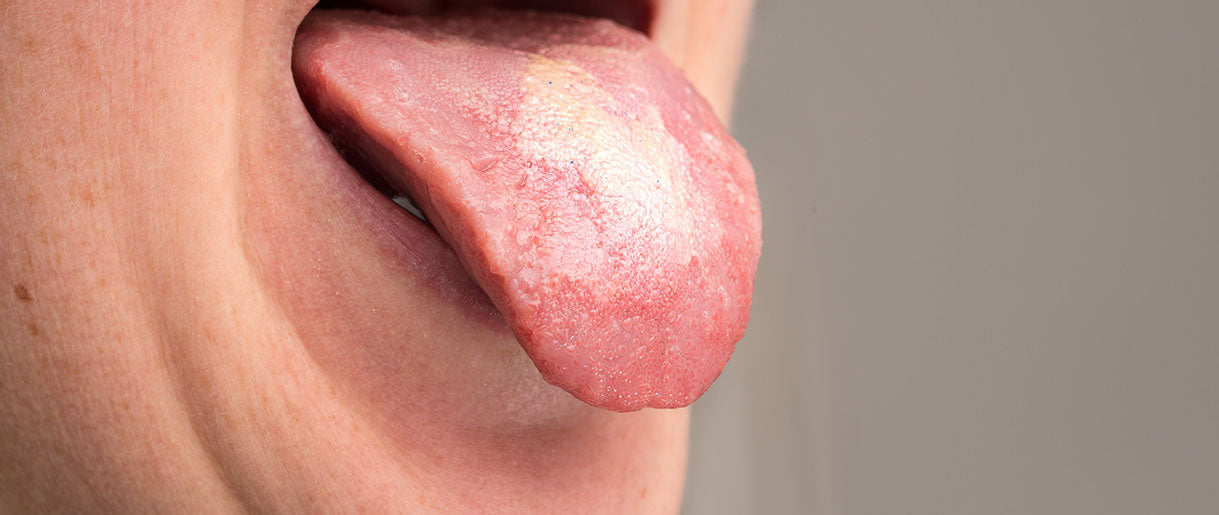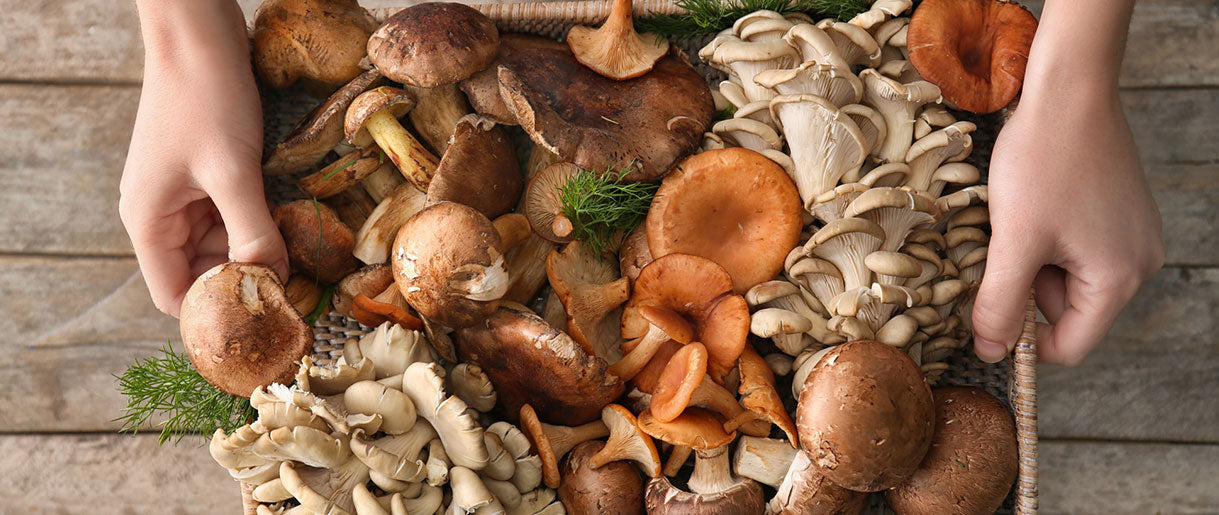We understand that the struggle with candida overgrowth is real; it can cause some very unpleasant and uncomfortable symptoms. Candida infection is prevalent and is caused by a yeast-like substance related to fungi. So, when it comes to candida infections, should you eat mushrooms or avoid them entirely?
Medicinal mushrooms candida benefits are numerous. For generations, they have been used to enhance immunity and keep illnesses at bay. While some specialists advise against eating mushrooms (since they are related to yeasts), there are no universally accepted dietary rules. However, medicinal mushrooms may be a different story.
Let’s explore mushroom candida effects and how to include them in your life.
Understanding Candida

Candida albicans is a yeast-like fungus, a normal and usually healthy organism within the body that aids in homeostasis maintenance. Candida can be found in our mucus membranes, on our genitalia, mouth, and in our digestive system. Candida albicans infect us all.
It only becomes a problem when there is an imbalance. And with this imbalance comes a slew of symptoms(1).
Infection can occur due to various circumstances, one of which is when the good (probiotic) microorganisms that usually keep candida numbers under control cannot regulate the increased number of pathogenic (disease-causing) microorganisms.
It is pretty rare for a candida overgrowth to occur on its own. Candida proliferation happens when an opportunity comes about, which is a weakened immune system. In general, candida will be found in the presence of an overall gut dysbiosis, parasites, a heavy metal load, and a viral or bacterial overload in the system. While not technically a cause, there are likely to be co-infections present, which means your healing protocol must take these into account.
Fungal infections grow in warm, moist parts of the body (genitals and mouth), and symptoms may include:
- Vaginal discharge or whitish lesions with a yeasty odor
- Itching, redness, and swelling in the afflicted areas
- Painful urination and sexual intercourse.
In addition to adopting a low-sugar diet, some experts advocate avoiding yeast-containing foods such as yeasted pieces of bread, yeast-containing spreads, and alcohol.
The Potential Role Of Mushrooms In Candida Management

Now, what’s the link between candida and mushrooms candida? There is considerable disagreement on whether mushrooms feed candida overgrowth or not. Some believe mushrooms promote the growth of candida yeast. They are hypothesized to cross-react with candida microorganisms since they are fungus family members.
Others believe that a new fungus put into the intestine may compete for nourishment with candida. We know that the mushrooms you'll find on grocery shelves are not the same as those utilized for medicinal purposes.
So, do you want mushroom stir-fry or no-mushroom stir-fry? You should avoid dietary mushrooms but try medicinal mushrooms to strengthen your immune system and combat infection.
Because harmful by-products are released into the body in large quantities, people suffering from candida overgrowth frequently have a weakened immune system. They often suffer from varying degrees of intestinal inflammation and permeability, which can also result in immune system malfunction and insufficiency.
Extensive studies have revealed that the long-chain carbohydrates found in medicinal mushrooms, beta-glucans(2), work as immunological boosters in the body, which have the following effects:
- Deliver a tremendous nourishing and healing impact.
- Boost NK cell production.
- Aid in activating macrophages (this occurs when white blood cells in the body begin to devour and digest cellular waste, bacteria, toxic compounds, and anything else that could damage the body).
When healing from candida overgrowth, we propose bringing in medicinal mushrooms; these mushrooms will help build your gut and immune system and increase your immune system's natural intelligence.
According to experts, humans are biologically built to accept these fungal polysaccharide components (found in medicinal mushrooms). These medicinal mushrooms will give much-needed ammunition for your gut health (where our immune system sits) and boost your neurological system and general sensations of well-being and tranquility.
When candida overruns one's system, the mind can become more anxious, which can be a horrible moment. Medicinal mushrooms will offer you a safe sanctuary during times of difficulty. These mushrooms are stars since they help your endocrine system be strengthened and balanced.
Mushrooms With Antifungal Properties

Amino acids, zinc, calcium, magnesium, selenium, and B vitamins, including folate, are all found in medicinal mushrooms. They are also low in sugar, contain prebiotics, and promote beneficial probiotic bacteria growth. Some of their active ingredients influence or improve immunological function.
Which medicinal mushrooms and candida go together? Certain mushrooms have antifungal properties, including antifungal efficacy against candida. The most effective candida mushrooms for candidiasis or candida overgrowth are:
- Lion's Mane
- Maitake
- Chaga
- Reishi
- Cordyceps
- Turkey tail
Ganoderma lucidum (Reishi)(3) has adaptogenic properties (it helps your body adapt to and cope with stress) and can aid the immune system. Reishi medicinal mushroom is high in immune-boosting beta-glucans and carbohydrates in fungal cell walls. Reishi has also been shown to be the most potent mushroom in inducing macrophages.
Grifola frondosa (Maitake), Trametes versicolor (Turkey tail), and Cordyceps sinensis (caterpillar mushroom) have also been utilized to support the immune system(4). Chaga (Inonotus obliquus) has an excellent affinity for the gut, which possesses anti-inflammatory and antioxidant properties that aid in mending the gut lining. Lion's mane mushrooms (Hericium erinaceus) have been demonstrated to improve immunological function, which means the immune system may be better equipped to generate an immune response against candida cells.
Incorporating Mushrooms Into Your Candida Protocol
Can you eat medicinal mushrooms on a candida diet? Yes, please! When selecting diet mushrooms, it's easy to become overwhelmed by the variety of options available. So we're making things simple and stress-free by offering four methods to incorporate functional mushrooms into your everyday routine.
1. Add mushroom powders to coffee, yogurt, granola, smoothies, or tea.
2. Cook with mushrooms like Lion’s mane that have a lobster-like taste.
3. Take a pill anywhere needed.
4. Place the tinctures under the tongue.
Precautions And Consultation
Medicinal mushrooms have many beneficial properties against candida. But they also have potential side effects such as allergies, upset stomach, nausea, skin rashes, thinning of blood, and liver damage. Always consult a healthcare professional or a qualified practitioner before starting any new supplementation or treatment regimen.
FAQs About Mushrooms Candida Benefits
Can I Use Mushrooms Alongside Antifungal Medications For Candida Overgrowth?
Instead of culinary mushrooms, medicinal mushrooms can be used alongside antifungal medications for candida overgrowth. These include Reishi, Chaga, Turkey tail, Lion’s mane, Reishi, and Maitake.
Can I Combine Different Types Of Mushrooms For Managing Candida Overgrowth?
You can mix medicinal mushrooms. There are no known reasons to avoid mixing any of the medicinal mushrooms.
How Long Does It Take To See Results When Using Mushrooms For Candida Management?
It takes time for your body to adjust to the new functional supplement once you start taking mushrooms. However, you may have to wait at least two weeks to notice the effects, but it is conceivable that you will feel the effect sooner.
Key Takeaway
There's no need to avoid mushrooms. Some, like Reishi, Cordyceps, Turkey tail, Maitake, Lion's mane, and chaga, are regarded to be "treatments" for fungal diseases. These mushrooms candida benefits include immune system boosting, gut balance, and treating fungal infections.
The real culprits for feeding candida are sugar, alcohol, and stress - not medicinal mushrooms!!
References
- Candidiasis, (1)https://www.ncbi.nlm.nih.gov/books/NBK560624/
- Effects of beta-glucans on the immune system, (2)https://pubmed.ncbi.nlm.nih.gov/17895634/
- Evaluation of Antianxiety Potential of Four Ganoderma (Agaricomycetes) Species from India in Mice, (3)https://pubmed.ncbi.nlm.nih.gov/28008811/
- Immune Modulation From Five Major Mushrooms: Application to Integrative Oncology, (4)https://www.ncbi.nlm.nih.gov/pmc/articles/PMC4684115/









Let Us Know Your Comments